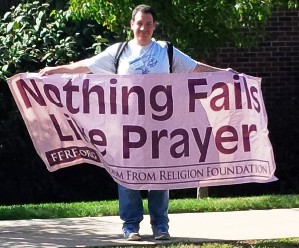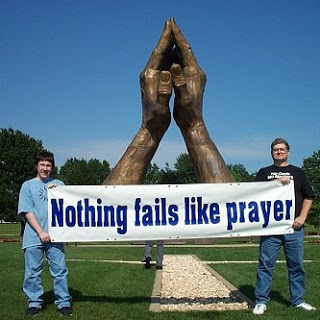Tomorrow is the National Day of Prayer (NDP) an annual event during which state level politicians kowtow to an evangelical Christian organization run by Shirley Dobson. Americans United for Separation of Church and State have a brief but excellent breakdown of nearly everything wrong with recognizing official days for prayer, which I commend to your reading. If you live in the United States, I also recommend that you read your state’s official proclamation. (Unless you have the good fortune to live in California, Hawaii, New Hampshire, or Washington; these states all appear to have sat out 2016, despite having issued proclamations in 2015.)
Some of these proclamations are fairly minimalist and ecumenical, others are outright preachy and sectarian. None of them are appropriate in a civil society that respects religious liberty for all—government officials have no business telling us when to worship, how to worship, or whom to worship, and they certainly have no business preaching the gospel to their constituents during elaborate worship services held inside the State Capitol, as Oklahoma Governor Mary Fallin has been known to do.

There are a range of rationalist responses to this annually recurring problem. The least common is to directly protest against government entanglement with religion, right across the street from where it is going down. This was the approach taken by the NEPA Freethought Society back in 2014 and by my own Oklahoma Atheists back in 2010. Countering the NDP in this way will definitely generate public attention, but it doesn’t seem particularly effective—in my own limited experience—at winning over hearts and minds.
A less confrontational approach might be to gather together with an ecumenical group in order to show solidarity with those who believe prayer shouldn’t be limited to one particular sect wielding an undue amount of political clout. This is the approach taken by various interfaith groups, such as the Interfaith Alliance of Oklahoma, who host a fascinatingly diverse Day of Reflection every year.

I know of many atheist activists who would be even less comfortable visiting with people of all faiths in a church than they would be holding up an aggressively anti-prayer banner in public, and quite a few more who would not be particularly comfortable in either setting. Which leads me to wonder whether we need to come up with a third way, neither protesting theocracy nor accommodating ourselves to the exigencies of interfaith dialogue.
If you’ve any useful ideas along these lines, please leave a comment below. We’ve only a year to plan ahead.
